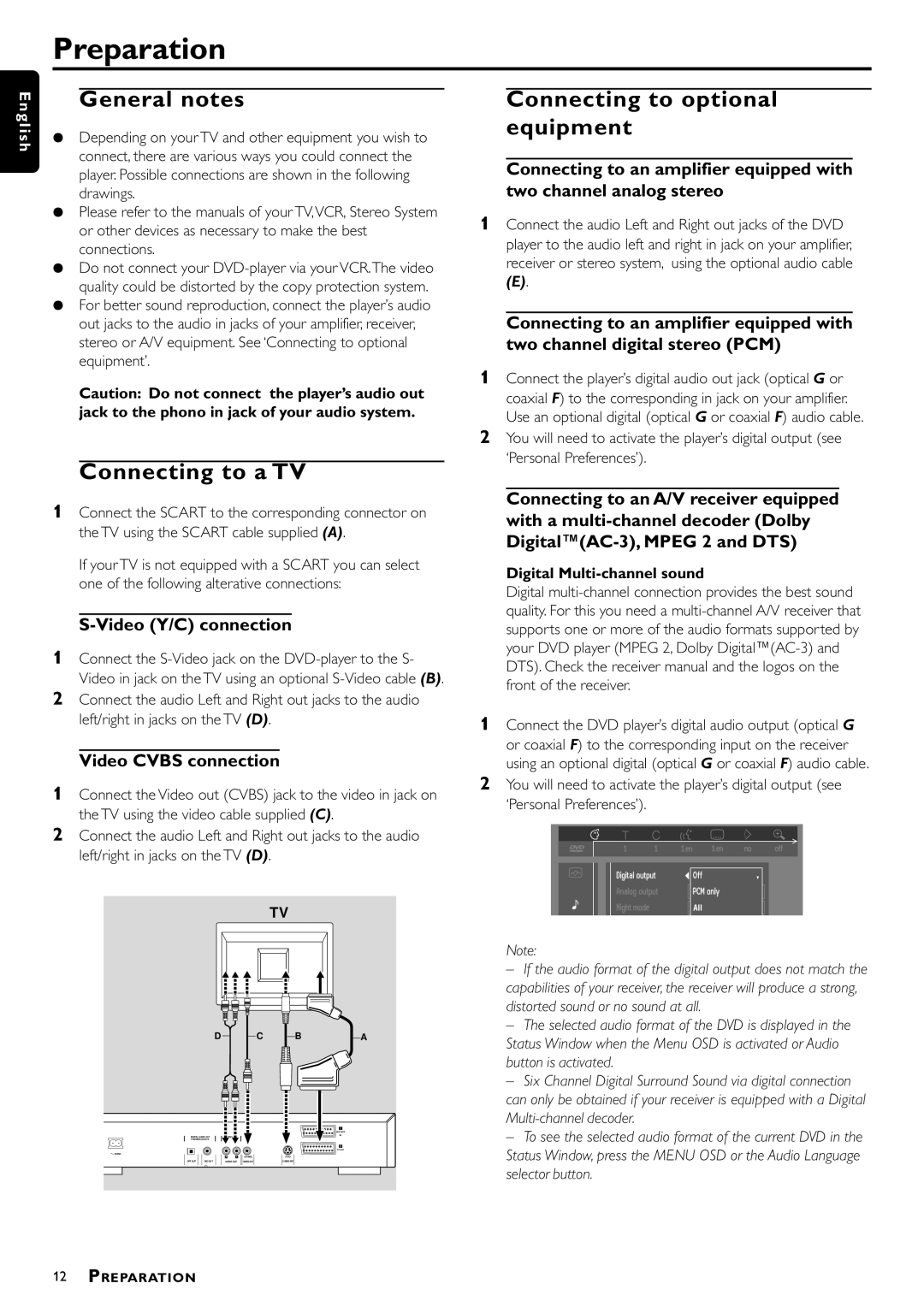
Preparation
E n g l i s h
General notes
¶Depending on your TV and other equipment you wish to connect, there are various ways you could connect the player. Possible connections are shown in the following drawings.
¶Please refer to the manuals of your TV,VCR, Stereo System or other devices as necessary to make the best connections.
¶Do not connect your
¶For better sound reproduction, connect the player’s audio out jacks to the audio in jacks of your amplifier, receiver, stereo or A/V equipment. See ‘Connecting to optional equipment’.
Caution: Do not connect the player’s audio out jack to the phono in jack of your audio system.
Connecting to a TV
1Connect the SCART to the corresponding connector on the TV using the SCART cable supplied (A).
If your TV is not equipped with a SCART you can select one of the following alterative connections:
S-Video (Y/C) connection
1Connect the
2Connect the audio Left and Right out jacks to the audio left/right in jacks on the TV (D).
Video CVBS connection
1Connect the Video out (CVBS) jack to the video in jack on the TV using the video cable supplied (C).
2Connect the audio Left and Right out jacks to the audio left/right in jacks on the TV (D).
TV
| D |
|
| C | B | A |
|
|
|
|
|
| I |
|
|
|
|
|
| AUX/VCR |
DIGITAL AUDIO OUT | STEREO OUT |
|
| IN | ||
|
|
| ||||
PCM/MPEG2/AC3/DTS |
|
|
|
|
| |
|
|
|
|
|
| II |
|
|
|
|
|
| TV OUT |
MAINS |
|
|
|
|
|
|
|
| R | L | (CVBS) | (Y/C) |
|
OPT OUT | DIG OUT | AUDIO OUT | VIDEO OUT |
| ||
Connecting to optional equipment
Connecting to an amplifier equipped with two channel analog stereo
1Connect the audio Left and Right out jacks of the DVD player to the audio left and right in jack on your amplifier, receiver or stereo system, using the optional audio cable
(E).
Connecting to an amplifier equipped with two channel digital stereo (PCM)
1Connect the player’s digital audio out jack (optical G or coaxial F) to the corresponding in jack on your amplifier. Use an optional digital (optical G or coaxial F) audio cable.
2You will need to activate the player’s digital output (see ‘Personal Preferences’).
Connecting to an A/V receiver equipped with a
Digital Multi-channel sound
Digital
1Connect the DVD player’s digital audio output (optical G or coaxial F) to the corresponding input on the receiver using an optional digital (optical G or coaxial F) audio cable.
2You will need to activate the player’s digital output (see ‘Personal Preferences’).
All
Note:
–If the audio format of the digital output does not match the capabilities of your receiver, the receiver will produce a strong, distorted sound or no sound at all.
–The selected audio format of the DVD is displayed in the Status Window when the Menu OSD is activated or Audio button is activated.
–Six Channel Digital Surround Sound via digital connection can only be obtained if your receiver is equipped with a Digital
–To see the selected audio format of the current DVD in the Status Window, press the MENU OSD or the Audio Language selector button.
